When it comes to finding the right pet for your life after retirement, felines are the cat’s meow. Low maintenance and mellow, cats require little work and offer big benefits.
After 65-year-old Fredi Miller retired from her job as a cat caregiver at Best Friends Animal Society in Kanab, Utah, she adopted a special needs cat, Naveen, who had been under her care at the sanctuary. In the months since Miller brought her home, Naveen has bonded with Miller’s other two cats and her special needs foster cat.
Naveen, who used to spend her days alone in a cat tree, now socializes and plays. Watching the cat’s personality blossom has brought much joy to Miller’s first months of retirement. “She adds so much to my life,” she says.
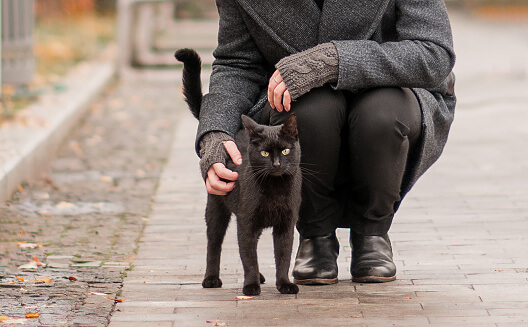
If you’re retired or planning to retire, you too might want to consider adding a feline friend to your life. Here are eight reasons cats make the best pets for retirees:
1
Quiet and Cozy Company
Plenty of retirees take up hobbies like cycling, running, and even skydiving, but for many, retirement is a time to settle into quieter pursuits like reading, coloring and binge-watching the must-see TV series your friends recommended. Cats make perfect companions for those low-key activities.
Despite their reputation for independence, many cats actually enjoy curling up on the couch with their humans, points out Steve Feldman, executive director of the Human Animal Bond Research Institute, a nonprofit organization that gathers and funds research on the benefits of companion animals.
Two of Miller’s cats love to snuggle up on her lap while she watches TV, but even Inga, her independently minded third cat, will climb into her lap when she’s in the mood. Miller says.
2
Purrs Provide Soothing White Noise
There’s something special about a cat’s purr, and many find the sound exceptionally calming. Cats likely purr for a variety of reasons, and in various situations, such as when they’re happy, hungry or even stressed. Think of it as a way to self-soothe.
Purring may even help cats to heal by reducing pain, repairing bones and stimulating muscle growth.
There’s even speculation that those same vibrations may have beneficial effects on human health, but more research needs to be done. In the meantime, we’ll have to take the word of cat owners who claim that the soft purrs of their favorite feline quells anxiety.
3
Petting Reduces Stress
There’s something especially wonderful about petting the soft, silky fur of a cat. A cat’s coat may contain as many as 130,000 hairs per square inch, which is one of the reasons it feels so luxurious to the touch. And petting your cat doesn’t just feel good, it’s good for you.
As you pet your cat, the level of oxytocin in your brain increases, Feldman explains. “Oxytocin is a really good hormone associated with reducing stress,” he adds. “The level of cortisol, which is a stress hormone, goes down when petting your cat.”
4
Cats Do Your Heart Good
Having a feline friend around may promote heart health. One study found that current cat owners, and even those who had lived with a cat in the past, had a lower risk of dying from a heart attack than those who never had a cat.
Should that stat send you to the local animal shelter to adopt a kitten companion? Give it some serious thought. Getting a cat “may represent a novel strategy for reducing the risk of cardiovascular disease in high-risk individuals,” according to the study.
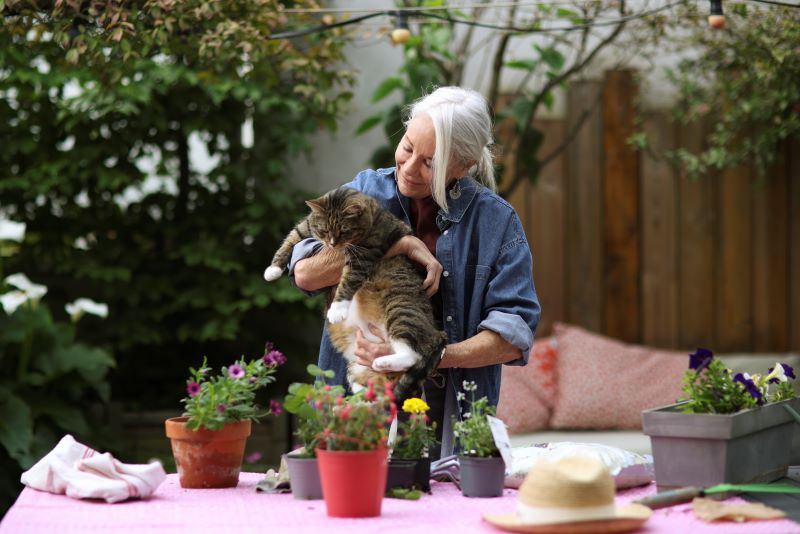
5
Joyful Movement
Generally, the daily tasks associated with cat care aren’t physically taxing, but some activities due encourage light exercise, which can be good for your health, says Darius Russin, MD, a family practice physician and geriatrician in Austin, Texas.
For example, lightly brushing a cat that enjoys being groomed can be beneficial if you have arthritis in your wrists, Russin explains. Playing with a feather-and-stick can provide an arm workout, along with exercise for your cat. And throwing a small ball for your cat to chase encourages you to move around as you go through the motions of throwing the ball, walking to wherever your cat drops it, and bending to pick it up, he adds.
6
Cats Are Self-Cleaning
A major bonus to having a cat is that you almost never have to bathe your cat or pay a groomer to do so (though, if you have a long-haired cat, you might want to opt for regular trims).
Cats are meticulous about grooming themselves, and may spend as much as half of each day cleaning their fur. This is good news for retirees who either can’t hoist an animal into a tub or would rather spend their free time doing something a little more fun than trying to suds up a reluctant pet.
Another upside on the cleanliness of cats: You’re unlikely to ever have to scrub muddy paw prints off your floors.
7
Priceless (But Also Affordable)
If you no longer have a steady paycheck coming in, you might be looking for an animal friend that won’t break that bank. While pets are often priceless in our hearts, any pet—even a fish—can become sick and require emergency vet care. But, the day-to-day expenses of a cat are typically manageable.
On average, cat owners typically spend less than dog owners on food and routine vet care. They also spend less on boarding when they take a vacation. With cats, you can have a friend or neighbor check on them while you’re gone. On top of this, cat owners likely spend less on toys too. This is because cats don’t destroy them as quickly as other pets.
8
Keep Your Neighbors Happy
If you’ve recently downsized, you might be living in an apartment, town home or other location where you’re closely surrounded by neighbors. Luckily, you probably won’t have to worry about your cat disturbing anyone who lives nearby. Cats are so quiet that your neighbors may not even realize you have a pet!
Are You Cat-Convinced Yet?
In short, there are countless reasons feline friends and retirement make a good match. “Cats are wonderful animals, and they make excellent companions,” Miller says. Whether you’re planning to slow down or want to pick up the pace, a cat will happily be there by your side through it all. (Even if their facial expressions don’t always show it.)
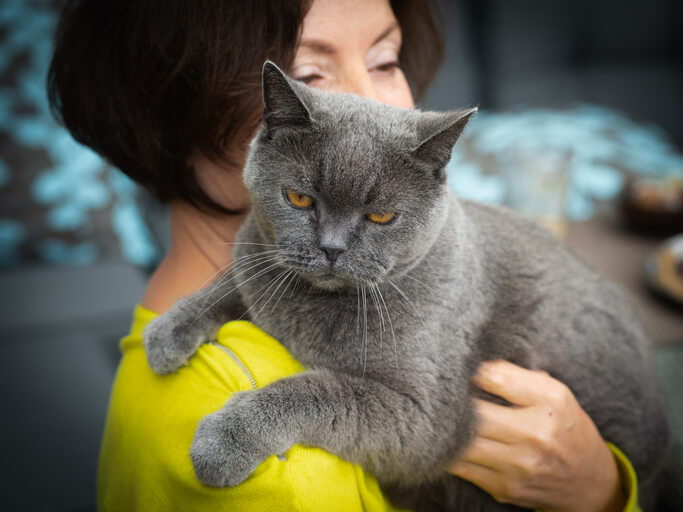


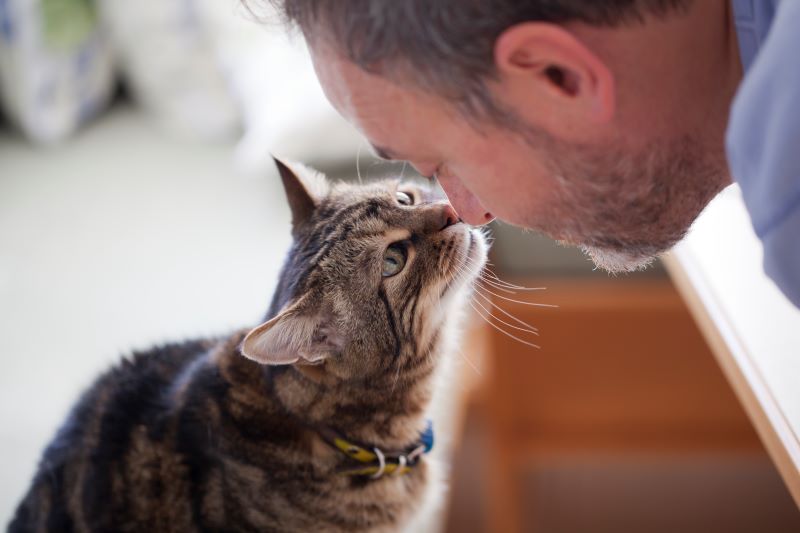


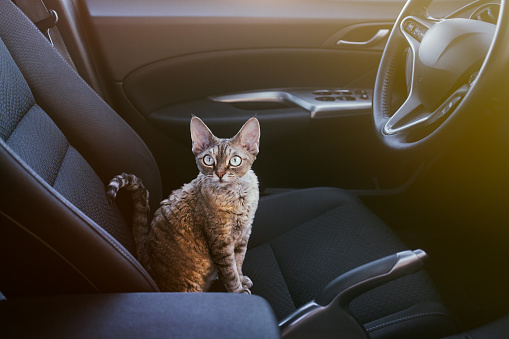
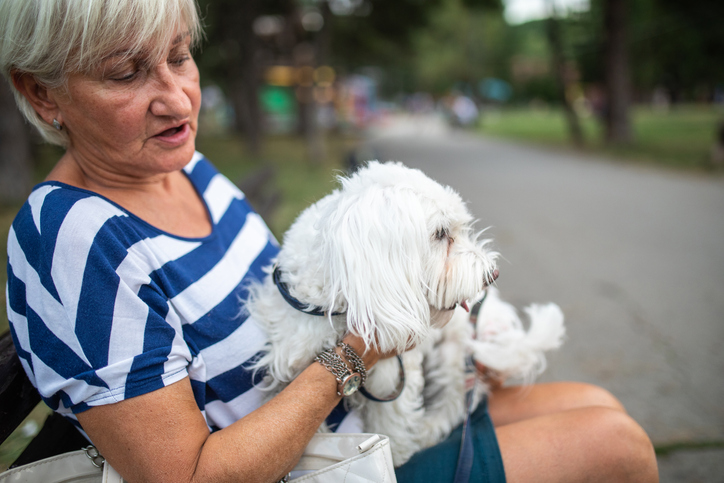

All true, but after seeing my mom lose her balance during visits when my cat got underfoot, I have forgone having another one during my retirement. Balance issues are important to consider in selecting post-working-life pets. Goldfish, anyone?
We have 3 cats all rescues and could not imagine life without them, they make us laugh, so entertaining to watch!
Reading the wonderful comments about cats, I truly agree. I’ve had cats most of my life. I just got a rehome 4 yr old beautiful brown tabby male. He is nuetered and house broken. Unfortunately I’m too old to care for him properly. He needs some retired people a bit younger then me. I’m 83. So, if anyone is interest in my beautiful boy please email me. I live in Kennewick Wa. #509-619-0312. If I don’t answer please leave me a message and I will get back with you.
I rescued Nina was two years old. Initially she was afraid of everything but now she’s about to turn five years old has become not only my shadow but quite a little chatter box 😁
I adopted two kittens at Petsmart who are now about to be 12 years old. To my surprise one of them turned out to be a Maine Coon cat and he has been a character from kittenhood. He loved to be twirled on my computer chair and when a friend came with a rollator, he sat on the seat and rode it as long as she wanted. He even sat on it while she slept waiting patiently for her to wake up and give him a ride again. He sleeps in the carrier on wheels which I use to (rarely) transport him to the vet. If I go near it, he jumps in hoping I will pull him around in it. When he sits on my lap, he will stay as long as I let him, but as he weighs around 20lbs. I usually have to stand up before my legs go to sleep. His sister who is a black and white short hair has a completely different personality. She takes her duties seriously. For years, I thought she was mute. Then I had to take both of them for their shots and found that she could meow just as loudly as he could. She just chooses to let him do the talking. Her duties which she took upon herself, are seeing me to the toilet every morning and in the evening when I ready myself for bed. I have learned to listen to her. If I am sitting in my chair, reading, watching TV or embroidering, she is on a table by my chair napping, but if I stay too long, she comes on my lap and lays down on my book, or work, and looks up at me, as if to say, enough of that. She stays for a few minutes, jumps down and looks at me. I usually take the hint and get up. They both keep me smiling, knowing full well, I am not the boss in my house, but a well loved slave.
great idea!
All that’s said is true but dealing with the litter box can be a chore especially if you live in an upper floor apartment. Also, vet costs can be astronomical for an older kitty especially if there are kidney issues.
My cat Astrid is almost 2 months shy now of 2 years old, she is feisty but she loves me I know this because she sleeps with me at night and when I take a nap! She does her zoomies and play nips me! She helps me with my depression a great deal! She is my ESA cat (emotional support animal) Astrid is a big help for such a smallish cat weighing at 9 lbs and I love her dearly!